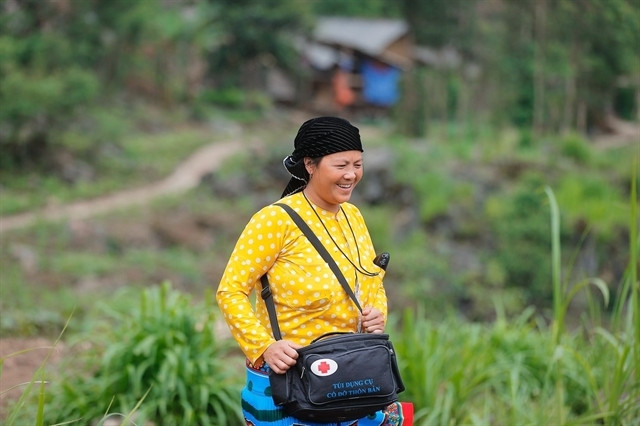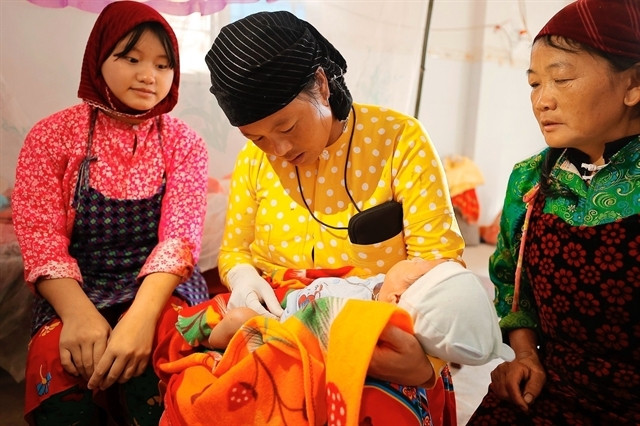 |
| Village-based midwife Vừ Thị Mỷ. VNA/VNS Photos |
For more than thirty years, Vừ Thị Mỷ has worked as a village-based midwife in the northern mountainous province of Hà Giang and helped over sixty mothers give birth.
She has also provided postpartum care for hundreds of mothers and newborns.
Despite operating without any funding, she remains committed to supporting mothers to be vaccinated and providing care for fetuses. She also persuaded the community to give up outdated practices and gain access to better medical care.
Located at the northernmost point of Việt Nam, Lũng Cú is one of the mountainous and border communes of Đồng Văn District.
Mỷ is sympathetic to the struggles faced by the local ethnic minority community, particularly those faced by women who manage several responsibilities such as farming, households and child care.
Every day, she travels far distance to take care of mothers and their babies.
She said the majority of women in the villages used to give birth at home and invite shamans for a ritual of afterbirth worship. The women's labour and delivery were fraught with lots of complications. Since the village-based midwife programme was launched more than ten years ago, every home birth case has had a doctor consultation, which has reduced the dangers to the mothers and their babies.
It was such a strange concept for local people to visit healthcare facilities for pregnancy check-up or childbirth, Mỷ said.
 |
| Midwife Vừ Thị Mỷ tends to a newborn in Lũng Cú Commune. |
The midwives in the villages have helped locals progressively realise how important reproductive healthcare is. More pregnant women visit the clinic for routine checkups and ask for home care when necessary, she told Vietnam News Agency.
Mother Sùng Thị Máy, living in Cẳng Tẳng Village, Lũng Cú Commune said she felt worried and faced lots of difficulties at the first childbirth time but following Mỷ's consultations, she feels relaxed.
Mỷ visits every mother’s house to remind them about the baby vaccination or postpartum examination schedule.
In the last 13 years, Mỷ has detected and transferred unusual and risky cases to higher-level healthcare facilities, all the while providing prenatal check-ups for nearly 900 cases.
Recalling her first time of helping a mother give birth, she said: "The mother went into labour at home at 2am in the morning. Upon assessing her health, I anticipated unfavourable outcomes and made the decision to send her to Yên Minh Hospital.
“Doctors said if she had given birth at home that day, both mother and child would have been in danger.
"I love my job even more now that I know the pregnant woman gave birth safely."
Following her 2008–2010 enrolment into a village-based midwifery programme, Mỷ began working in the Đồng Văn District.
In addition to identifying risky pregnancy cases and encouraging mothers to seek post partum check ups, the knowledge that Mỷ has imparted to the locals has increasingly supplanted the customs of the area.
As a village leader, she has coordinated with the commune’s clinic and local authorities to launch immunisation and malnutrition prevention campaigns.
Dr Nguyễn Duy Đông, head of Lũng Cú Commune’s Clinic said due to the remote location, low literacy levels and outdated childbirth customs, the reproductive health status of the ethnic community was never given due attention. Since 2010, the community has been more conscious of maternal health and childbirth thanks to the assistance of midwives like Mỷ.
Nguyễn Văn Giao, director of Hà Giang Province Department of Health, said the village-based midwife team is like a centre for maternal care, providing invaluable health advice.
However he added that because the midwives are working without pay, it will be difficult to keep the team together. The department has called for relevant bodies to offer financial support to the midwives. VNS